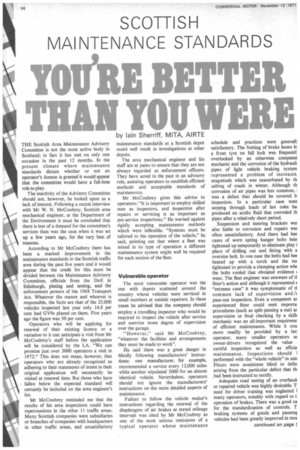SCOTTISH MAINTENANCE STANDARDS
Page 98

Page 101

If you've noticed an error in this article please click here to report it so we can fix it.
YOU'RE BETTER THAN YOU WERE
by lain Sherriff, MITA, AIRTE
THE Scottish Area Maintenance Advisory Committee is not the most active body in Scotland; in fact it has met on only one occasion in the past 12 months. In the present climate where maintenance standards dictate whether or not an operator's licence is granted it would appear that the committee would have a full-time role to play.
The inactivity of the Advisory Committee should not, however, be looked upon as a lack of interest. Following a recent interview with Mr W. N. McCoubrey, Scottish area mechanical engineer, at the Department of the Environment it must be concluded that there is less of a demand for the committee's services than was the case .when it was set up a few years ago, for the very best of reasons.
According to Mr McCoubrey there has been a marked improvement in the maintenance standards in the Scottish traffic area during the past five years and it would appear that the credit for this must be divided between the Maintenance Advisory Committee, officials from the DoE in Edinburgh, plating and testing, and the enforcement powers of the 1968 Transport Act. Whatever the reason and whoever is responsible, the facts are that of the 25,000 vehicles inspected last year only 14.8 per cent had GV9s placed on them. Five years ago the figure was 50 per cent.
Operators who will be applying for renewal of their existing licence or a variation to it can anticipate a visit from Mr McCoubrey's staff before the application will be considered by the LA. "We can promise just over 3000 operators a visit in 1972." This does not mean, however, that operators who are already recognized as adhering to their statements of intent in their original application will necessarily be visited at renewal time. But those who have fallen below the expected standard will certainly be included on the area engineer's list.
Mr McCoubrey reminded me that the results of his area inspections could have repercussions in the other 11 traffic areas. Many Scottish companies were subsidiaries or branches of companies with headquarters in other traffic areas, and unsatisfactory maintenance standalds at a Scottish depot could well result in investigations at other depots.
The area mechanical engineer and his staff are at pains to ensure that they are not always regarded as enforcement officers. They have acted in the past in an advisory role, assisting operators to establish efficient methods and acceptable standards of maintenance.
Mr McCoubrey gives this advice to operators: "It is important to employ skilled men as inspectors, and inspection after repairs or servicing is as important as pre-service inspections." He warned against rigidly accepting maintenance methods which were inflexible. "Systems must be tailored to the operation of the vehicle," he said, pointing out that where a fleet was mixed in its type of operation a different maintenance system might well be required for each section of the fleet.
Vulnerable operator
The most vulnerable operator was the one with depots scattered around the country whose vehicles were serviced in small numbers at outside repairers. In these cases be advised that the company should employ a travelling inspector who would be required to inspect the vehicle after service and exercise some degree of supervision over the garage.
"However," said Mr McCoubrey, "whatever the facilities and arrangements they must be made to work".
He said there was a great danger in blindly following manufacturers' instructions: one manufacturer, for example, recommended a service every 12,000 miles while another stipulated 3000 for an almost identical vehicle. Nevertheless, operators should not ignore the manufacturers' instructions on the more detailed aspects of maintenance.
Failure to follow the vehicle maker's instructions regarding the renewal of the diaphragms of air brakes at stated mileage intervals was cited by Mr McCoubrey as one of the most serious omissions of a typical operator whose maintenance
schedule and practices were general!: satisfactory. The fretting of brake hoses b: a front tyre on full lock was frequentl: overlooked by an otherwise competen mechanic and the corrosion of the hydrauli pipes of light vehicle braking system represented a problem of increasin, magnitude which was exacerbated by th salting of roads in winter. Although th corrosion of air pipes was less common, i was a defect that should be covered b. inspection. In a particular case wate seeping through loads of hot coke ha produced an acidic fluid that corroded th pipes after a relatively short period.
Suspension and steering brackets wet also liable to corrosion and repairs wer often unsatisfactory. And there had bee cases of worn spring hanger bolts bein tightened up temporarily to eliminate play i place of drilling out and fitting with a oversize bolt. In one case the bolts had bee heated up with a torch and the nu' tightened to provide a clamping action whe the bolts cooled that obviated evidence ( wear. The fleet engineer was unaware of ti fitter's action and although it represented a "extreme case" it was symptomatic of tt common lack of supervision and/r pass-out inspection. Even a competent ar experienced fitter could omit importa, procedures (such as split-pinning a nut) ar supervision or final checking by a skill( mechanic was an all-important requireme of efficient maintenance. While it cou more readily be provided by a lan operator, many smaller operators at owner-drivers recognized the value
careful inspection as well as efficie maintenance. Inspections should I performed with the "whole vehicle" in min Fitters were sonietimes blind to defer arising from the particular defect that th had been instructed to rectify.
Adequate road testing of an overhauli or repaired vehicle was highly desirable. T' need for driver training was neglected I many operators, notably with regard to t operation of brakes. There was a good ca for the standardization of controls. T braking systems of goods and passeng vehicles had been greatly improved in reef continued on page .! years but unfortunately the improvement had been obtained by complication and sophistication.
Complaints The difficulty of dealing with complaints against a noisy vehicle by householders in built-up areas represented a particularly difficult problem because a regulation noise check had to be made in an area free from buildings and so on that reflected noise. It was normal practice to ask the operator to "go another way round" to avoid being a noise nuisance.
While the emission of dense smoke by a diesel-engined vehicle was a "non-arguable" fault, the notification of which was accepted by the average operator, the problem of the vehicle that smoked on the odd occasion for no obvious reason was one that could defeat the examiner as well as the operator and was treated as such.
It is to the credit of Scottish operators that Mr McCoubrey reports that his staff did not issue one prohibition last year for defects which had resulted from neglect. There was a growing awareness that both the operator and the engineer had a vital role to play in any transport organization. "In this respect," he said, -east and west are beginning to meet."
It seems that not only in this respect are east and west meeting. Mr J. Ramsay, secretary of the Maintenance Advisory Committee, reports that never before has the Scottish operator enjoyed such an outstanding spare parts service as he does today. Mr Ramsay agrees with Mr McCoubrey that maintenance standards are vastly improved on a few years ago and suggests that it is because spare parts are more readily available that this state of affairs exists.
Last year the committee met with the vehicle manufacturers and thrashed out the whole question of spares availability. There were criticisms by both parties but the net result has been all-round improvement. consequently vehicles are being repaired expeditiously and not run with minor defects which escalate to major overhauls.
The 1971 meeting of the committee took place on September 9 and again the principal item on the agenda was spare parts. Earlier in the year the committee had heard that BLMC was closing the spares department at Albion Motors in Scotstoun, Glasgow, and that in future Albion spares would have to be obtained at AEC in Glasgow's East End or Millburn Motors in the north -central area. The news of the closure was viewed with concern and the committee kept a watchful eye on the situation. The September meeting heard that under the reorganized system Albion spares had become more readily available.
The committee is not insensitive to the criticism that it does not meet regularly. "This does not mean that we are inactive," said Mr Ramsay. "Committee members are always available to take telephone calls concerning maintenance matters and we are
prepared to visit operators in any part of Scotland to help solve those problems." What does concern the committee is that new operators may not be aware of the existence of the service. It may be that they will adopt a system whereby all applicants who have been granted a licence and whose particulars appear in Applications and Decisions will receive an explanatory note from the committee. Mr Ramsay said that they were determined to do all in their power to maintain standards of servicing at their present high level and where possible to improve on the standard.
The services of the Maintenance Advisory Committee are available free to all 0-licensed operators and its members are located at centres from Inverness to the Forth/Clyde valley. Officers of the Scottish traffic area of the DoE sit on the committee in an advisory capacity and the Road Haulage Association and Freight Transport Association are also represented.
The chairman is H. M. Dick, who was formerly transport manager to the SCWS Ltd in Glasgow.










































































































































































































